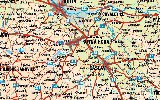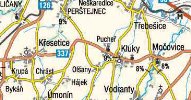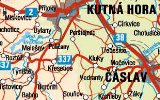
Note:
These excerpts contain three footnotes which are designated by asterisks
*) in the text. The footnotes are Dr.Josef(*1864)'s
comments regarding
the spelling of the family surname,
the "Cernik's legend" and some
persecutions during the 18th century.
Text:
p.3
As "the branch of Pucher" [which is a part of Frydrich's "Kresetice" line] the descendants of those members of the Vejborny family are identified *) who, having confessed the helvetian evangelic [Protestant] faith after "the Patent of Toleration" was issued [in 1781], have stuck at the inherited traditions of their ancestors.
They were the three brothers [8Jan(*1747), 8Jiri(*1748),
8Josef(*1750)] who have settled as "the familiants" [new-settlers]
and have confessed the new [Protestant] faith.
...
---------------------------------------------------------------
p.4
As the three brothers confessed immediately they have avoided obstacles and delays contrived later (since Jan 1, 1783) to those wanting to follow them. Also as "the familiants" they were of a more independent position not being driven by patrimonial or lord authorities such strongly as some others...
---------------------------------------------------------------After dismissal of the Jesuit Order in 1773 ... the former patrimonial yard was divided to individual parts endowed with rights according to emphyteusis...
---------------------------------------------------------------
Such a way the new "familiant" villages originated: Puker, Pritoka, Pabenice, Korutice, Opatovice [where the evangelical church, parish and school existed in the 19th century - see "Opatovice II" in the SE corner of the map], Cerniny, Zisov, Malejovice.
----------------------------------------------------------------...Books of the late [10/9] Wacslaw Wejborny given to the "Vcela" association in Caslav town...
-...as a field-master he used to take religious books (of "the Secret Czech Brothers" or something like this) with him in the fields. Vybornys both of Puker and of Mancice told me that. Once while on a pastureland being absorbed into reading he almost did not notice a Jesuit approaching him. So he threw the book as if it were a stone thrown after the herd in the field and drove the sheep away. After the Jesuit has searched him thoroughly..
---------------------------------------------------------------..and gone away, he retrieved the book and put it in a safe place...
---------------------------------------------------------------... I suppose all this tradition concerns more likely to some of his [=8Jan(*1747)'s] ancestors (i.e. to his father or his grandfather). Both of them had lived in Pabenice as opposed to himself - and such severe actions against heresy took place before the period 1770-80, the most probable during 1730-40. The three brothers could have listened to those stories from their grandfather in Krupa who lived untill 1779 (up to ten years after death of their father)...
---------------------------------------------------------------
Vacslav Vejborny Senior the former field-master living in Krupa village later died there aged 80 - his great-grandson was aged 9 that time *) .
... It was an advantage to be as a familiant during the time when...
---------------------------------------------------------------... other people were still subject to manorial labor - though not as severe around Kresetice as at some other localities*).
Both Jiri and Jan took advantage of the possibility to become "familiants" and had made their younger brother Josef to take-over one familiant's piece of land too.
---------------------------------------------------------------... Vaclav Vejborny the field master (the son of Frydrich) was one of those who had met some old men born before the battle on White Mountain. Such men had remembered old Czech glory and Czech freedom. Perhaps a great deal of the old tradition preserved relates back to him [= to 10Wacslaw(*1690)]...
---------------------------------------------------------------
 ...
the church [evangelic] in
Mocovice was consecrated in September
1785. The whole family thus entered a new period of its life.
A tie of the new faith (which was beloved by them with enthusiasm)
attached all its members to each other. Earlier, they had attended
secret services carried out somewhere in the region of
Zaky. But now
they could declare their faith in public and stand facing freely
their fellow-citizens.
...
the church [evangelic] in
Mocovice was consecrated in September
1785. The whole family thus entered a new period of its life.
A tie of the new faith (which was beloved by them with enthusiasm)
attached all its members to each other. Earlier, they had attended
secret services carried out somewhere in the region of
Zaky. But now
they could declare their faith in public and stand facing freely
their fellow-citizens.
Their faith had been a substantial handicap for them earlier.
They had to behave very carefully and not to make any mistakes.
This turned out to their advantage, however, as it improved
invariability, strenght of their mind and strong personalities.
They have educated by renunciation, hardship and avoiding various
obstructions. Their knowledge of the spiritual heritage of their
forefathers uplifted them over others and increased their moral
superiority. This spiritual heritage was the result of an experience
unique to them and a few others...
... The following letter of the priest of the [catholic] parish of Cirkvice to the Archdean of Kutna Hora is given below to illustrate circumstances in Bohemia after the battle on White Mountain during the period of so called "Counter-Reformation". An example of the way of persecution of "Secret Czech Brothers" is recorded there:
"I the undersigned do testify and inform my very reverend
Archdean of Kutna Hora that having looked for transgressions
in faith of my parishioners three days ago I have found
quite unexpectedly many of them in the following way:
The magistrate of the village of St. Catharina declared in the
presence of others that Satan and the False-Prophet have appeared
in a human body in surrounding forests at night around the recent
Easter Holidays. This Satan has called many farmers from various
demesnes to the fire there. Then he prepared the bread and the cup,
all of them took the Eucharist and his preaching lasted for one
and half-hours.
This news frightened my spirit very much as the same day I
committed one woman to prison and fellows who were suspected to
had informed citizens of St. Catharina about arrival of this
False-Prophet. On questioning she declared later two other women
have come in that forest with her. Those women admitted then
six others from surrounding villages and three farmers [were
present there]. So I imprisoned three women yet and one farmer
who succeeded in escaping.
Therefore, my very reverend, it is necessary to intervene in
time for the spark in ashes to be canceled and so that a
destructive fire would be quashed before it begins.
I beg advice from you and to transmit this my letter to our
most serene Cardinal.
As I am not able to gain any certification of transgressions
in faith from many of these [imprisoned individuals], I will
force them using violence to do so.
Written in Cirkvice, the parish office on July 31, 1658. P. Basilius Wierzbicki of the Carmelite Order [S.P.M.] priest of Cirkvice."